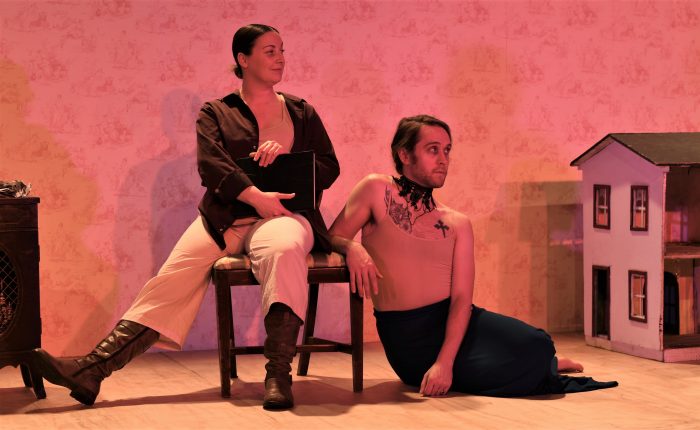
Three Sisters Two by Reza de Wet. Brenna Geffers directs for EgoPo Classic Theater, Philadelphia, February 2019.
There’s a connection between Anton Chekhov’s Three Sisters, Reza de Wet’s Three Sisters Two, and the actual coming of black government to South Africa. There’s even resonance to the United States today where some of Donald Trump’s supporters dread the emergence of a non-white majority. The common theme is changing social orders.
Chekhov wrote Three Sisters in 1900. During his brief lifetime he witnessed the results of the abolition of serfdom, as former owners had to sell their lands because they couldn’t manage estates without the free labor of their former serfs. The bourgeoisie and intelligentsia were caught in the middle, with no power, as Czar Alexander III clamped down on non-Russians and non-Orthodox and university professors in order to “save” Russia from “modernism.”
De Wet wrote this sequel in 1997, at the mid-point of Nelson Mandela’s presidency when apartheid gave way to multiracial democracy. Her play shows Chekhov’s characters twenty years after we last saw them. The Czar has been overthrown and the bolshevik Red Army has defeated the White Army which tried to compromise between capitalism and socialism. The Reds took hostages and sometimes shot them in order to force compliance.
People like the Prozorovs, the family in Three Sisters, are fearful of the proletariat. They dream of — and constantly speak of — going back to their old home in Moscow where life was wonderful. They are longing for the good old days when their Russia was great.
Masha’s Red Army lover, who provided protection for the family, has been arrested. No one is safe. Explosions and gunfire are heard in the distance. Peasants now occupy part of the large Prozorov house, and the EgoPo production provides brief hints of these intruders at the far end of its stage.
De Wet was a priviliged Afrikaner born in 1952 when many whites thought that the world they lived in was safe. (She died of leukemia in 2012.) Her script preserves some of Chekhov’s melancholy tone of comedy but lacks his subtlety. Director Brenna Geffers has taken the melodramatically lamenting de Wet characters and accentuated their emotions by casting many of them with opposite genders. This has the effect of reminding us that roles are reversing, the old order is gone, the times they are a changin.’ It also gives opportunity for some flashy acting.
Jahzeer Terrell is a disappointed, complaining elder Olga; Andrew J. Carroll is a mercurial middle sister Masha; and Lee Minora is a distracted Irena, the youngest, continually gathering flowers. Amanda Schoonover is a pathetic brother Andrey who now is a minor official in the communist regime, and Maria Konstantinidis is a domineering Natasha, Andrey’s wife.
Colleen Corcoran is aristocratic as Lieutenant-Colonel Aleksandr Vershinin, a role played by Stanislavski in the premiere of the Chekhov play. Vershinin was a high officer in the White Russian army that overthrew the czar but then was defeated by the Bolsheviks. That new government is now executing all the “enemies of the state” that it can find, so he is in danger and can’t travel with the family. His limp, caused by a war injury, is symbolic of his impotent state.
Vershinin has the play’s most heartbreaking lines: “Our old life is gone. We shall all be forgotten. Everything passes so quickly; years and faces simply vanished.” He has written a memoir and carefully hands it to Andrey and Natasha’s daughter Sofja (Kishia Nixon) as a gift — but she leaves it behind as she departs for Moscow. Thus he is denied the ability to pass along his memories to succeeding generations.
Ross Beschler is effective as the playwright Igor, who is rooming in the house but is peripheral in the drama. The cast exhibits sleight-of-hand with the aged nanny who can’t comprehend what’s going on, and who is impersonated by differing actors.
Masha, by the way, is a woman of culture and refinement, who has affairs — similar to the actress who played Masha in the premiere and then married Chekhov.
Three Sisters Two is part of EgoPo’s season of South African theater. Next comes Master Harold and the Boys alternating with Egoli, showing us life in South Africa from both white and black perspectives.
In this play, de Wet emphasized the evil of the Bolsheviks more than the faults of the Prozorov family. This production thus leads us to sympathize, nostalgically, with the old order, whether it be in Russia, South Africa, or America. That’s a stimulating counter-cultural point of view.